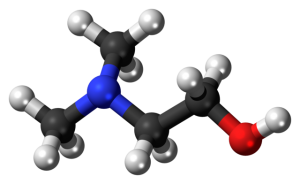Natural compound Dimethylaminoethanol (DMAE) may support concentration and memory.

- Supporting acetylcholine, a neurotransmitter particularly involved in memory function.
- Improving concentration in children with attention deficit disorder.
Overview
Dimethylaminoethanol (Deanol, DMAE) is a natural compound produced in the brain that is similar to choline. DMAE works mainly as a precursor to acetylcholine, a neurotransmitter involved with memory. It is also present in food, with particularly high concentrations in fish such as anchovies and sardines.
Clinically, DMAE is used to help with ADHD, Alzheimer’s, and the general deterioration of memory seen in aging. Despite this, DMAE is far more popular as a general nootropic aid for healthy individuals, sold either by itself or as the main active ingredient of the compound centrophenoxine. DMAE is also often used in a nootropic stack with piracetam, because choline compounds are believed to enhance its effects.

How DMAE Might Help the Brain
Antioxidant activity
DMAE has been suggested to improve brain cell membrane fluidity by acting as an antioxidant, which may ward off age-related cognitive decline.1
Potential support of acetylcholine levels
DMAE is similar to choline and has been shown to increase choline levels in the brains of animals. As such, the main hypothesis for how it might function as a nootropic is by supplying choline needed for synthesis of the neurotransmitter acetylcholine, which is particularly involved in memory and learning.
DMAE’s Potential Nootropic Benefits
As a nootropic supplement, DMAE is advertised to support memory and concentration. Given its possible role in acetylcholine synthesis and improvement of concentration in children with ADHD, there is some limited research evidence to support these benefits. However, more clinical trials are needed to say anything conclusive.
In addition, DMAE has been suggested as a possible anti-aging compound. A 1973 study reported that centrophenoxine and DMAE supplementation in mice resulted in longer average and maximum lifespan.2
Research
Animal Research
DMAE appears to boost brain choline levels in rats
In this animal experiment rats were administered DMAE, causing an increase in brain choline concentrations. However, this increase in choline did not result in a subsequent increase of acetylcholine levels.
- The researchers concluded that “since [2H6]deanol did increase brain choline, it may prove therapeutically useful when the production of choline is reduced or when the utilization of choline for the synthesis of acetylcholine is impaired“3
Human Research
DMAE has not seen much human research, and most of the studies were performed in the 1960s and 70s. Furthermore, it has yet to be studied as nootropic in healthy individuals.
DMAE (1800 mg) may improve mental well-being in people with dementia
In this study, 14 people with senile dementia were given DMAE at increasing doses (max of 1800 mg) daily for 4 weeks to see if it would improve cognitive impairment. Ten of the patients were found to improve in terms of reduced depression, irritability and anxiety, and increased motivation. However, the treatment did not affect memory or other cognitive functions.
- The researchers concluded that “although deanol may not improve memory, it may produce positive behavioral changes in some senile patients“4
DMAE (100 mg) may improve attention in hyperactive children
This study examined DMAE in the therapy of hyperactivity. Researchers administered DMAE (100 mg), trimeglamide (a sedative), or placebo to 75 hyperactive children. DMAE was found to improve concentration, while trimeglamide reduced hyperactivity.
- The researchers suggested “the concomitant use of these two drugs in overly aggressive, emotionally disturbed children”5
Nootropic Dosage
- Researchers have used widely varying doses of DMAE (50 – 1800 mg daily)
- Most DMAE supplements provide 150 – 250 mg per capsule
- DMAE is frequently stacked with piracetam
Supplements in Review Says
- DMAE 250 mg 1-3 times daily.
DMAE may improve memory or concentration in some individuals. DMAE appears to be the kind of nootropic that can benefit some people (like those who may have low acetylcholine levels for one reason or another, or have a medical condition such as ADD) but do nothing for others. Furthermore, centrophenoxine appears to be a better choice.
Given the scarcity of research, it’s best to stick to supplement dosages. The most widely used DMAE supplements provide 250 mg taken 1-3 times daily.
Leave a Reply